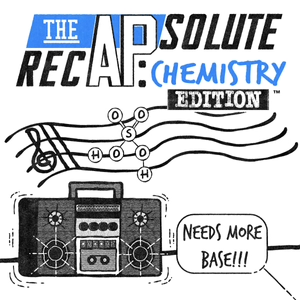
The APsolute RecAP: Chemistry Edition - Episode 60: Factors Affecting the Dissolution of a Salt
01/18/22 • 9 min
This episode is an application of earlier discussed concepts. In episode 33 we talked about disruptions affecting equilibrium: concentration, temperature and pressure. In episode 34, solubility equilibria, we talked about the dissolution of a salt. In this episode we set our focus a bit differently: We look at environmental factors, like pH or other dissolved ions and how they affect the dissolution of a salt. pH was a concept introduced in Unit 4 with more in depth coverage in unit 8 It's all connected. So, let’s recap the recaps that lay the foundation for this episode, then introduce the new concepts and dive into how these factors affect the dissolution of a salt.
Thank you for listening to The APsolute RecAP: Chemistry Edition!
(AP is a registered trademark of the College Board and is not affiliated with The APsolute RecAP. Copyright 2021 - The APsolute RecAP, LLC. All rights reserved.)
Website:
EMAIL:
Follow Us:
This episode is an application of earlier discussed concepts. In episode 33 we talked about disruptions affecting equilibrium: concentration, temperature and pressure. In episode 34, solubility equilibria, we talked about the dissolution of a salt. In this episode we set our focus a bit differently: We look at environmental factors, like pH or other dissolved ions and how they affect the dissolution of a salt. pH was a concept introduced in Unit 4 with more in depth coverage in unit 8 It's all connected. So, let’s recap the recaps that lay the foundation for this episode, then introduce the new concepts and dive into how these factors affect the dissolution of a salt.
Thank you for listening to The APsolute RecAP: Chemistry Edition!
(AP is a registered trademark of the College Board and is not affiliated with The APsolute RecAP. Copyright 2021 - The APsolute RecAP, LLC. All rights reserved.)
Website:
EMAIL:
Follow Us:
Previous Episode

The APsolute RecAP: Chemistry Edition - Episode 59: Unit 6 selected FRQs
Unit 6 is all about the big idea Energy (0:46). Episode 59 discusses the questions 2021 - Question 4, 2017 - Question 5 and 2013 - Question 3. These are released FRQs from previous exams and copyright of the College Board.
Question 4 of the 2021 exam starts with our favorite equation: mcAT (1:34). In part b) you calculate the mass of iron and in part (c) discuss the effect of doubling the mass of iron on the maximum temperature. Question 5 of the 2017 looks at similar concepts, but it is a combustion reaction (3:40). It starts again with calculating the magnitude of heat energy and using mcAT. In part (b) we calculate how much energy 1 mole of 2-propanol would release. Part (c) asks about the effect of having a water/propanol mixture on the final temperature. Question 3 of the 2013 exam starts with stoichiometry - identifying the limiting reactant (5:30) and in part (b) the inconsistent trial. In (c) we are using again mCAT for our calculations. (D) and (e) have us calculate the enthalpy - in d) using experimental data, in (e) as enthalpy of formation. In (f) we are provided with an explanation for the discrepancy between (d) and (e) and are asked to explain if that could be the reason.
Today’s Question of the day is about Enthalpy. How do we calculate the enthalpy using bond enthalpies?
A. bonds broken - bonds formed B. bonds formed - bonds broken C. bonds broken + bonds formed D. bonds formed + bonds broken
Thank you for listening to The APsolute RecAP: Chemistry Edition!
(AP is a registered trademark of the College Board and is not affiliated with The APsolute RecAP. Copyright 2021 - The APsolute RecAP, LLC. All rights reserved.)
Website:
EMAIL:
Follow Us:
Next Episode

The APsolute RecAP: Chemistry Edition - Episode 61: Unit 7 Selected FRQs
The FRQ questions on the AP exam often combine content from two or three different units. In today’s episode, we are emphasizing questions that require knowledge and skills from Unit 7: Equilibrium. You will rarely find an FRQ that solely focuses on Unit 7, since it lays the foundation for Unit 8, acids and bases as well as parts of Unit 9, Application of Thermodynamics. It also links back to concepts from earlier units, like gas laws. The questions we are using today are online accessible. Our suggestion: Answer the questions yourself and then listen to this episode to hear the explanations, as well as do’s and don'ts for answering questions of Unit 7. We will review 2016 - Question 6, 2015 - Question 4 and 2014 - Question 4. These are released FRQs from previous exams and copyright of the College Board.
Thank you for listening to The APsolute RecAP: Chemistry Edition!
(AP is a registered trademark of the College Board and is not affiliated with The APsolute RecAP. Copyright 2022 - The APsolute RecAP, LLC. All rights reserved.)
Website:
EMAIL:
Follow Us:
If you like this episode you’ll love
Episode Comments
Generate a badge
Get a badge for your website that links back to this episode
<a href="https://goodpods.com/podcasts/the-apsolute-recap-chemistry-edition-450043/the-apsolute-recap-chemistry-edition-episode-60-factors-affecting-the-61354405"> <img src="https://storage.googleapis.com/goodpods-images-bucket/badges/generic-badge-1.svg" alt="listen to the apsolute recap: chemistry edition - episode 60: factors affecting the dissolution of a salt on goodpods" style="width: 225px" /> </a>
Copy




